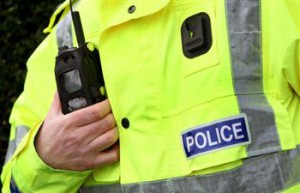
ONE of Scotland’s top police forces has banned its officers from wearing mirrored sunglasses.
An entire chapter on sunglasses etiquette is included in a new dress guide for officers from Fife Police – and aviator shades are out.
Critics have directed their ire at the force claiming the 24-page document, which also provides guidance on how officers use their mobile phones, is a waste of money.
But a top Scottish psychologist says the outlawing of mirrored shades could be a positive move away from “intimidating” US-style policing.
The Dress and Personal Appearance Standard Operating Procedures guide claims Fife Police is “committed” to providing the public with a “high level of professionalism and quality of service”.
Discreet
The shades section, simply headed “Sunglasses”, offers strict guidelines for officers and other police staff. “Spectacles and sunglasses, must be of a suitable, discreet pattern and may be worn at the individual’s own risk,” it says. “They should be constructed of unbreakable material to prevent injury.”
Officers “with a need” to wear sunglasses are asked to comply with a number of conditions.
“Mirrored lenses are not permitted”, says the guide. And sunglasses “will only be worn in bright sunlight when driving a car, riding a motorcycle or pedal cycle, during road traffic related duties or in circumstances where a significant level of personal risk exists”, says the author.
Any sunglasses worn by officers “must be removed when dealing with an incident or speaking with members of the public”.
An entire chapter is also devoted to rules relating to mobile phones. Officers and staff are allowed to carry personal mobile phones, but the mobiles must be on “discreet” or “vibrate” mode at all times to “minimise distractions and inconvenience to colleagues and members of the public”.
“Ring tones applied to any phones (personal or issued) should not detract from the professional image of the organisation whilst at work. All police officers and police staff should adopt a standard telephone ringing tone and not a musical or other inappropriate form of ring tone whilst at work. This is to avoid embarrassment or the portraying of an unprofessional image.”
Dress smartly
The rule book also has a section on deportment of staff. It says: “The chewing of gum, smoking in public and the eating of food or consumption of drinks in police vehicles are examples of inappropriate and unacceptable behaviour.”
Plain clothes officers are not expected to wear uniform, says the guide, but “flamboyant, provocative, offensive or casual styles unsuitable for a professional working environment are not acceptable”.
Police staff not required to wear uniform should “dress smartly”. Clothing should “not be revealing”. Cropped tops that “reveal the midriff” are not permitted.
Pullovers can only be worn in police offices. But officers are not allowed to roll their sleeves up, says the guide.
A section on hair advises officers that hair dye may be used by police officers provided the resultant colour is “natural” or “neutral”.
Police officers’ sideburns “must not extend below the earlobe”, according to one of the rules.
False nails are also banned because they are deemed a health and safety hazard.
The guide also offers sections entitled ‘Gloves and Scarves’ and ‘Trouser and Skirts’.
Matthew Elliott, chief executive of the TaxPayers’ Alliance branded the rule book as waste of money. He said: “Police chiefs shouldn’t be tying officers in knots with rules and regulations over issues which just require a bit of common sense. Taxpayers want their money spent on bobbies on the beat, not rulebooks telling officers what to have as their ringtone or where to eat their lunch. Whilst some of the advice might have important significance because of the unique job the police do, most of this simply interfering codswallop.”
Trust
However, Ewan Gillon, who is the professor of psychology at the Glasgow Caledonian University, and clinical director of First Psychology Scotland, said: “Eye-to-eye contact is one of the primary ways in which we establish trust with other people. Not to be able to see someone’s eyes makes it very difficult for trust to be established. You need to be able to build trust for people to feel secure and for people to feel you are asserting yourself properly.
“Mirrored sunglasses prevent the eyes being visible in any shape or form. It can be very intimidating to members of the public and can invoke images of American cop-style policing.”
A spokeswoman for Fife police said she was not aware of the new guide or the ban on mirrored sunglasses. She said: “It’s news to me. I wasn’t aware of anything like this.”
“All police officers and staff wear uniform or clothing appropriate to their duties,” she added.
An introduction to the guide claims appearance is “critical”. The author says “perceptions are quickly formed based on first impressions, which can be difficult to change”. “We must therefore seek to present a positive and professional image at all times and ensure this image reflects and reinforces the high standards of service we aim to provide,” it says
Police officers at neighbouring Lothian and Borders will not have to follow the strict new regulations on sunglasses, said a spokesman.
And Strathclyde Police said they would not be introducing a ban on mirrored sunglasses.